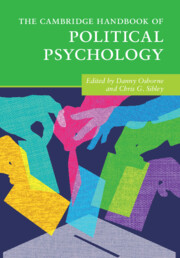Book contents
- The Cambridge Handbook of Political Psychology
- The Cambridge Handbook of Political Psychology
- Copyright page
- Dedication
- Contents
- Figures
- Tables
- Contributors
- Part I Foundations of Political Psychology
- Part II The Politics of Intergroup Attitudes
- Part III Contemporary Challenges to Democracy
- Part IV Diversifying Perspectives in Political Psychology
- 37 Political Psychology in the Global South
- 38 Political Psychology in the Arab Region
- 39 Critical Perspectives in Political Psychology
- 40 Rethinking Group Dynamics
- 41 Two Sides of the Same Coin
- Index
- References
41 - Two Sides of the Same Coin
A New Look at Differences and Similarities across Political Ideology
from Part IV - Diversifying Perspectives in Political Psychology
Published online by Cambridge University Press: 17 February 2022
- The Cambridge Handbook of Political Psychology
- The Cambridge Handbook of Political Psychology
- Copyright page
- Dedication
- Contents
- Figures
- Tables
- Contributors
- Part I Foundations of Political Psychology
- Part II The Politics of Intergroup Attitudes
- Part III Contemporary Challenges to Democracy
- Part IV Diversifying Perspectives in Political Psychology
- 37 Political Psychology in the Global South
- 38 Political Psychology in the Arab Region
- 39 Critical Perspectives in Political Psychology
- 40 Rethinking Group Dynamics
- 41 Two Sides of the Same Coin
- Index
- References
Summary
Traditionally, one of the main focuses of political psychology has been to identify the motives, needs, and other deep psychological differences shape ideological differences between liberals and conservatives bottom-up. We review this literature and offer some critique of it. Next, we argue that rather than trying to test how deep psychological differences produce ideological differences, it may be more fruitful to test how liberals’ and conservatives’ support for and opposition to specific political policies depends on how these policies are construed. We propose that this top-down approach not only offers methodological and theoretical advantages, while requiring less theoretical assumptions, but also may have the applied benefit of allowing the field to help opponents understand the reason for their mutual opposition and identify routes to increase cooperation across the ideological divide. This can help political psychology be a force that promotes overcoming partisan polarisation and increasing mutual understanding.
- Type
- Chapter
- Information
- The Cambridge Handbook of Political Psychology , pp. 674 - 686Publisher: Cambridge University PressPrint publication year: 2022
References
- 1
- Cited by



